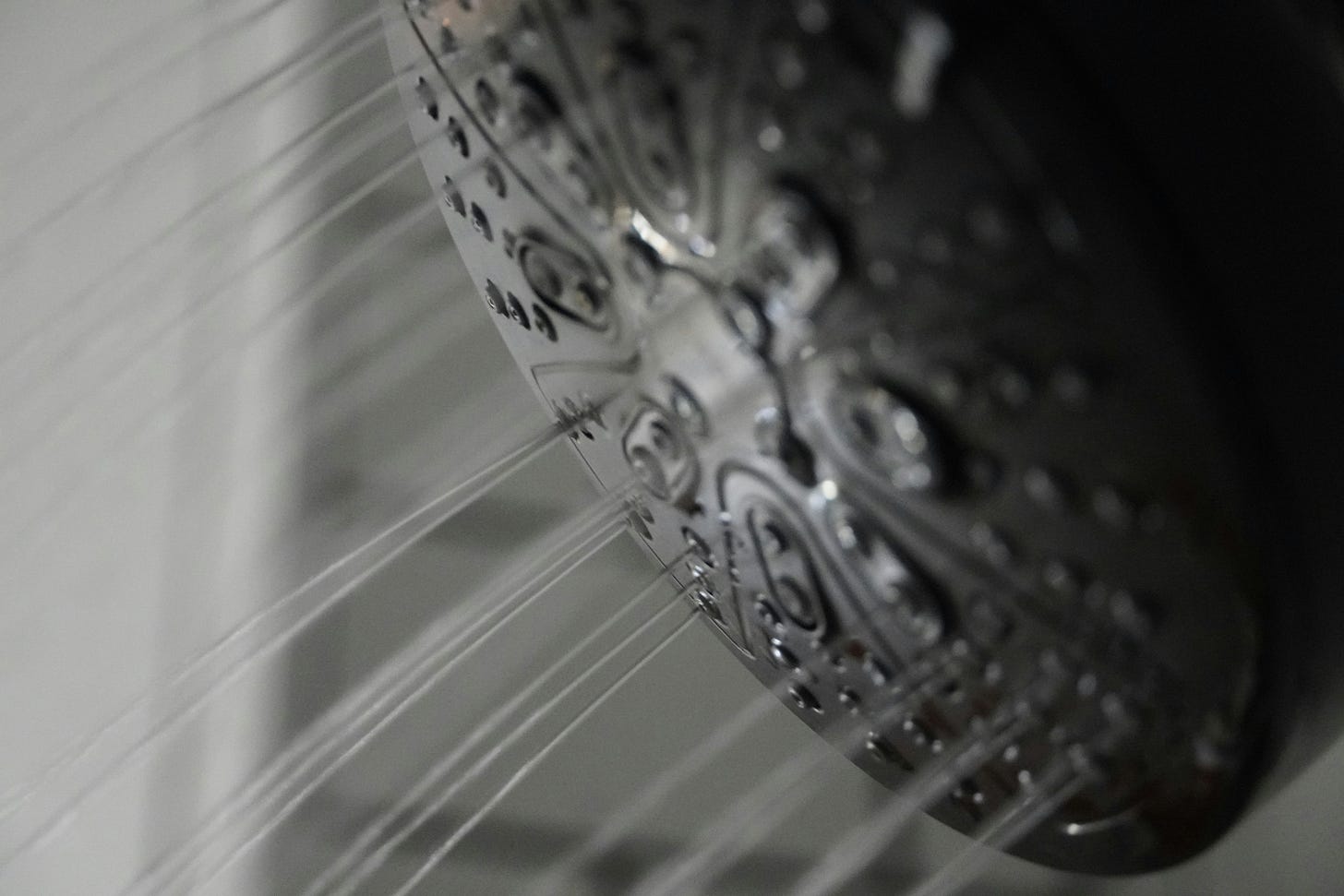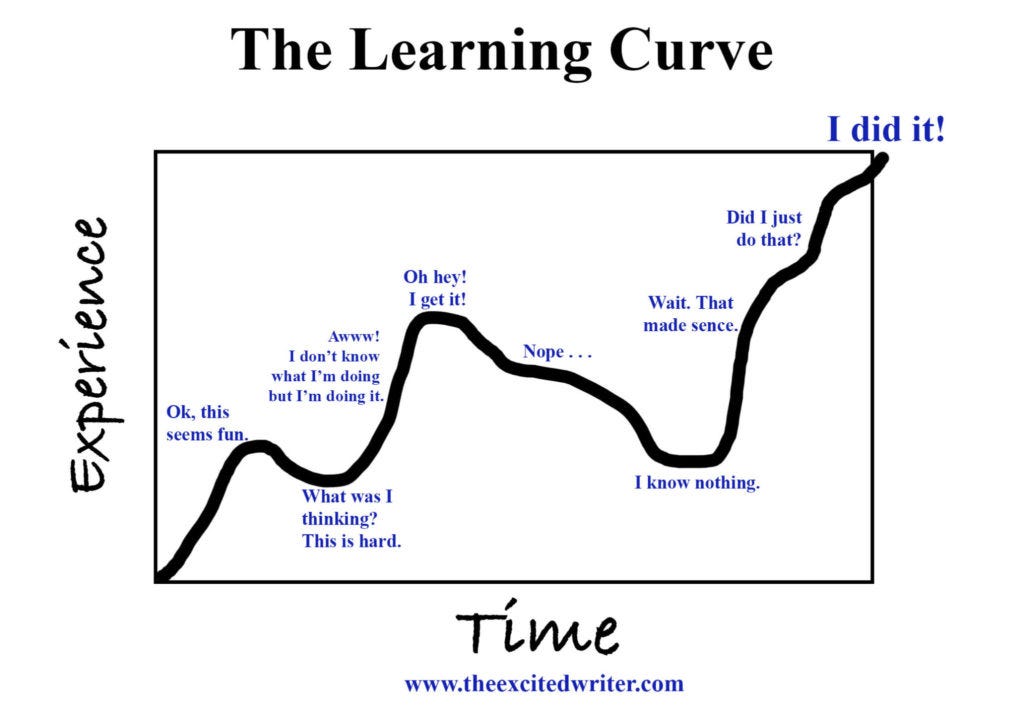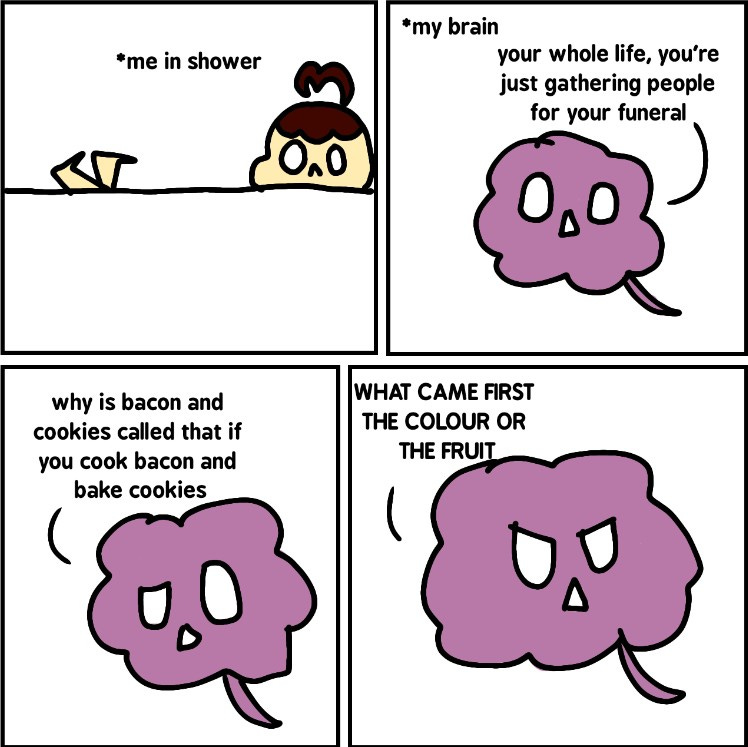Shower Thoughts
While many may be curious about your dreams, it's your shower thoughts that hold the answers.

For the past twenty days, I’ve been living alone while my husband is away on an official trip. Although my daily routine hasn't changed much in his absence, I did manage to start this page, and I'm now writing my third article. This brings up an interesting question: what's driving this boost in my productivity? If you’ve read my earlier article, you’ll know that I have been making the case for anti-producitivity. While I do believe part of my resistance stemmed from trying to measure work and hustle to meet capatilistic standards, there’s more to it than just that. As mentioned, my routine largely remains the same—cooking, cleaning, doing dishes, laundry—and in addition, I’ve been binge-watching series my husband wouldn’t normally watch. Still, I find myself getting more done. Now, some might argue that women are often burdened with the majority of household chores, leaving them with little time for personal pursuits. However, that’s not the case for me. My husband also does his fair share of household chores when he is around.
While I pondered on what was reducing my resistence to work these days, I remembered the concept of context switching taught in my undergrad computer science class. Simply put, context switching refers to the steps your computer takes to save your work when you switch to another task or application. When we return to the original task, the system loads the saved information back onto the memory, allowing us to pick up where we left off. While computers can manage multiple applications at once, frequent context switching often reduces system performance considering the time and energy required to save and retrieve necessary information. Interestingly, as you might have guessed, this concept also applies to humans when we switch from one task to another. This is why we often hear productivity advice urging us to minimize distractions, stay focused, and optimize our energy. But following this advice often leads to us sticking to a robotic routine.
But what if we, as humans, could perform certain tasks without having to context switch? This is where mindless activities like showering, doing dishes, or laundry come in. The Washington Post aptly refers to it as "mind wandering", while Paul Graham, in his essay, calls it "The Top Idea in Your Mind." I prefer to call it "shower thoughts". The concept behind shower thoughts is that the task you're doing is not mentally demanding enough, which allows your mind to wander and think about something else—often something more intriguing. When I'm feeling disturbed, angry, sad, or even too excited, I often do the dishes to help calm myself down. While washing the dishes keeps me distracted enough to prevent my emotions from completely taking over, it doesn't feel like I'm avoiding or numbing my feelings. I've realized that this is why I prefer doing the dishes myself, rather than running the dishwasher, as my husband often suggests.
But it is not just about when you have these shower thoughts; its also about what’s most likely to pop into your mind. While we don’t directly control what we are thinking about, typically, we tend to think about what seems most important to us at any given moment. So, if you’re trying to stick to a rigid schedule throughout the day, the schedule will most likely dominate your thoughts. While doing the dishes, for instance, all you might be able to focus on is how quickly you can finish so you can move on to the next task at hand. Now, imagine doing this day after day, every single day of your life, where all you can think about is what comes next? Hence, productivity hacks in itself might be counterproductive.
You can't directly control where your thoughts drift. If you're controlling them, they're not drifting. But you can control them indirectly, by controlling what situations you let yourself get into. That has been the lesson for me: be careful what you let become critical to you. Try to get yourself into situations where the most urgent problems are ones you want to think about. - Paul Graham
These days, with my husband away, I no longer feel the pressure to clock out of work at 5 p.m. My life feels much more flexible, and occasionally, spending a few extra minutes on work no longer makes me feel guilty about neglecting my personal life. I also don’t rush through breakfast anymore; instead, I often finish my meal at my desk while attending remote meetings. While this might seem unhealthy in theory, surprisingly, not constantly worrying about these boundaries doesn't make me feel like I am always connected to work. In fact, I’ve noticed that I experience much less resistance when context switching from meal prep to work. It gives me a sense of flow, effortlessly transitioning from one activity to the next. I find myself having more engaging ‘shower thoughts’ about my work goals while doing household chores, and getting excited about what I’ll watch after clocking out of work while still working. This contrast between context switching in computers versus humans which is making my life feel more fuller and authentic is in fact, one of the realisations that dawned on me while I was thinking about ways to optimise code performance while cooking. These days, I often rush back to my desk to quickly jot down insights regarding my work before I forget them. However, my point isn’t about letting work freely spill into the rest of my life. Instead, it’s that compartmentalising my life into boxes like work, home, grocery shopping, cleaning, etc., has left me more disconnected from myself and my thoughts. The excitement that these insights bring is akin to the joy a child experiences when offered a treat.
I recently came across Leigh W. Hart's book on Reparenting Your Inner Child, in which he introduces the concepts of the Inner Child and Inner Adult as two distinct aspects of our personalities. The Inner Child embodies qualities like innocence, curiosity, spontaneity, and vulnerability, while the Inner Adult represents more rational and responsible traits. Reflecting on my life during my twenties, I often feel that, in my drive to hustle and secure my place in the world, I unintentionally silenced my Inner Child. Every time I chose to work late into the night instead of spending time with family, I prioritized adult responsibilities. As I shared in my previous article, my focus has been on earning my master’s degree and securing a full-time job. Only recently have I had the chance to pause and reflect on my journey. When I did, the first thought that came to mind was how different adult life feels from what I had imagined when I was younger. I vividly remember receiving my first paycheck in 2016—it felt like a major victory, as though I had conquered the world and was poised to make a difference. But since then, I’ve been so caught up in the hustle that I’ve lost sight of the original intention to work on meaningful projects. Like many others at the start of their careers, I had no choice but to take the first opportunity that came my way. The hustle becomes so ingrained that we often forget why we chose this path in the first place.
I believe when we silence our Inner Child, we also tend to suppress the curious, spontanious and sometimes humour filled inner commentary that emerges. This commentary often manifests as "shower thoughts," which can help us process emotions or spark creative insights. While I regularly meditate and journal, I find that these practices tend to highlight my Inner Adult, focusing on logic and rational thinking. After all, you don’t usually sit down to journal a thought such as, “If you get out of your shower clean, how does your towel get dirty?”. My absolute Eureka moment while planning this article was when I realised that Geeks for Geeks (a popular website for software nerds) actually has a page named “Shower Thoughts”.
Aside from robotic hustling being the sole reason for fewer shower thoughts, I also suppose increased social media usage also has a role to play in silencing our inner child and, by extention, our shower thoughts. Social media is engineered and keep us perpetually engaged, leaving little room for our minds to roam freely. The content we encounter on these platforms can also be mentally and emotionally taxing, which may leave us feeling disconnected and numb, as our thoughts are drowned out by the ideas and opinions of others. This becomes particularly damaging when social media, with its constant flow of information, robs us of our sense of purpose or spark by providing answers to everything we need. Do you remember there used to be a time when we really despised “know-it-alls”, because they seemed to dampen our spirits?
An individual is typically driven by his sense of purpose in life- mostly wanting to find his place in this world. This journey begins with the process of learning. While the learning curve is often filled with exciting Aha! moments, it's soon realized that mastering something is a challenging feat. We often resolve not to give up on the task at hand until we carve out our own path. But how motivated would you feel if you discovered that path has already been paved for you, and all you need to do is stick to the prescribed syllabus? This is the reality of life in the age of the internet, where, if you intend to pick up a new hobby or skill, your social media algorithms are quietly observing you, and then dampening your enthusiasm by showing you evidence that there are a hundred others who have already achieved this, and they’re bound to be far better at it than you ever imagined. Then the only choice that it leaves you is to follow their footsteps, in the path paved by them. This results in a robotic copying act which defeats the whole purpose of setting out on this journey. A recent shower thought I had was that, there is one thing that social media algorithms have not been able to crack - it is love and authentic relationships. It remains the one thing humans continue to seek beyond the virtual world, yet it also seems to be what we struggle with the most. I am yet to figure out if that is a more optimistic trend or otherwise.

So, is having good shower thoughts the secret to a purposeful and fulfilling life? Well, the answer could be both yes and no. While Paul Graham states ‘it's hard to do a really good job on anything you don't think about in the shower’, you can’t simply add "have good shower thoughts" to your to-do list because all you'll end up focusing on is "I need to have good thoughts”. This defeats the whole purpose of letting your mind wander. However, shower thoughts do serve as a valuable indicator of what truly matters to you, offering insight into the inner dialogue that we often feel disconnected from. For your mind to wander towards more creative, insightful thoughts that fuel your sense of purpose and drive progress toward your goals, you would be required to clean up your act by steering clear of: information overload, stress resulting from a hectic schedule or procastination, and surely external conflicts that only contribute to inner unrest. I like to believe that our minds are naturally curious; we just need to avoid letting the world dampen our spirit! While most of us are hustling, we have no clue what we are hustling for, and its with these shower thoughts that we get to reflect. As for the increased productivity behind writing this article, well this whole article has been a series of shower thoughts.

Inspirations for this article were:
The Top Idea in Your Mind by Paul Graham - reading this article is what made me realise that these days work is normally always on the top of my mind which has helped me immensely despite being surrounded by distractions during the holiday season. Generally, when my husband is around I am rushing with my tasks, driven by the fear of letting work spill into the rest of my life.
Why do we get our best ideas in the shower? by Washington Post
Reparenting Your Wounded Inner Child: Explore Childhood and Generational Trauma to Break Destructive Patterns, Build Emotional Strength, and Achieve Personal Growth with 7 Empowering Steps book by Leigh W. Hart - I did not pick up this book with the intent to resolve trauma. While journaling, I often felt that my adult life was vastly different from what I had anticipated. I felt like a completely different person—not in a positive way—like something had changed since I began building my career. Even though my career choices were entirely my own, I still felt a disconnect. Just being aware of the inner child now helps me work on certain tasks without being too hard on myself. Many of the journaling prompts made me realize how I have disconnected and forgotten what this career meant to the teenage girl while making this choice.




